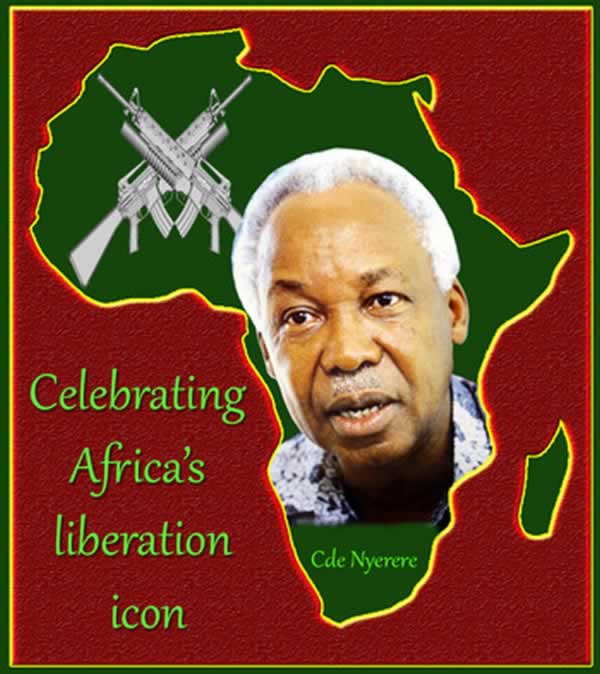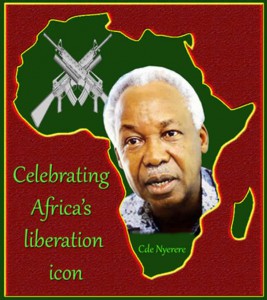
The Sunday Mail

 Last week, we published the first part of a speech delivered by Tanzania’s founding President, Mwalimu Julius Nyerere, who was the Special Guest of Honour and Keynote Speaker at the closure of the Organisation of African Unity Liberation Committee on 15 August 1994. Today, we publish the second and final part of the address.
Last week, we published the first part of a speech delivered by Tanzania’s founding President, Mwalimu Julius Nyerere, who was the Special Guest of Honour and Keynote Speaker at the closure of the Organisation of African Unity Liberation Committee on 15 August 1994. Today, we publish the second and final part of the address.
Perhaps most important of all was a fear of jeopardising the fragile unity which the very fact of forming the OAU represented!
For the establishment of the OAU itself constituted a joining together in one organisation of the members of two erstwhile African organisations – the so-called Monrovia and Casablanca Groups – each of which had tended to be rather suspicious and wary of the purposes and intentions of the other.
The OAU is now more than 30 years of age. While vigilance about its unity must always be maintained, its origins have passed into history and are no longer a threat to greater unity.
Yet we cannot deny that there are other threats, we cannot pretend that we are working deliberately to strengthen the organisation’s unity.
On the contrary, we are careless about the unity of the OAU. There have even been questions about its usefulness now that Africa is liberated from foreign or racists rule.
Certainly, very few (if any) of our countries give questions of African unity, or the future of the OAU itself, priority in the foreign or trade policy strategies.
Many of us do not even give any priority to paying our annual subscriptions to the OAU – although that rarely stops us from complaining about all the things its leaders and its secretariat should do but do not!
Almost all members of the OAU are poor and weak politically and economically; most are grappling with an unbearable external debt, and many have become hostage to the ideologies of the IMF and the World Bank.
When we are involved in international negotiations and our representatives in Geneva or New York have worked out a common African or Group of 77 position, we instruct our ambassadors to abandon that position if the ambassador of one of the “donor” countries comes to our government leaders at home to urge that we should do so.
When we are under pressure from an external source, or in any other political trouble which we cannot solve internally, we do not go the OAU for help; we do not even consult the OAU before applying elsewhere.
Instead, we say that the OAU must not interfere because that would be a derogation of our national sovereignty – as if France, Britain or the US, to which we appear more willing to apply, would act only on the basis of disinterested altruism, while our own organisation is supposed to have a motive!
Time and again, many of our countries act as individual mendicant nations, not each as a part of one Africa. So, each one of us, and Africa as a whole, stays a weak and marginalised part of the world.
Yet that is not surprising: the OAU has no strategy for unity.
As far as unity is concerned, the OAU is still more of an aspiration than a fact. We united for our liberation, and Africa is now liberated. On other issues of common concern, we do not unite. We leave matters to the chance of having a good secretary-general of the OAU and an active chairman who is committed to unity.
Under those circumstances, the OAU does manage to do considerable good work for Africa – more through diplomacy and the exploitation of Africa’s potential for the future than because of Africa’s current unity.
Your Excellencies, that is not enough. We are wasting time, and we are wasting the abilities of our peoples. We are wasting the potential of our united strength.
Unity is never easy to achieve, but we must no longer be content with the very low degree we have attained, and with which so much was achieved in support of Africa’s liberation.
The OAU Founding Fathers set up the Liberation Committee. I am urging the current generation of our leaders and peoples to begin the movement towards African Unity by setting up a Unity Committee of the Organisation of the African Unity.
The task of that committee would be to plan for unity, to work out the steps needed to move towards unity and to campaign for unity.
I am of the past. In my generation we did some things and we failed to do others.
One of the things we failed to do was deliberately to work for unity: we made mistakes of assuming unity!
Knowing its importance, we talked about unity. But then for the most part we determined national and even OAU policies as if the need to act in unity and to build unity was irrelevant.
I am urging that this generation of African leaders should correct the failures of my generation. Establish a unity committee of the OAU and give it full backing in action.
Match the talk for unity. Plan for it and work for it with the same relentless determination as the liberation vanguard worked for the liberation of our continent from alien and racist oppression.
Setting up a unity committee will not immediately create unity. But it can be a beginning of the deliberate movement towards unity.
Its success will take time and will depend upon its work in reinvigorating the demand for unity and the call for unity: success will depend upon its practical work in campaigning for unity, and planning the steps towards African unity.
Such a unity committee of the OAU will not start from nothing, we have regional organisations, we have functional organisations.
Most of all, we have the foundation to build on – the OAU itself, and its achievements so far.
How else can we make Africa really Africa, and not only a collection of 52 sovereign states whose leaders meet every year to pass resolutions, and often to ignore them?
We need unity. Without unity there is no future for our continent. We know it.
Every day’s news demonstrates Africa’s problems, and the manner in which the outside world can ignore Africa or interfere in Africa at its will.
We need unity for security and stability.
We need to make real that total political liberation of Africa which we are now celebrating. We need it to reduce our dependence on external powers.
We need unity to be able to take our rightful place in the governance of the world – in order to be listened to, and to be respected, not pitied or disregarded because we are weak and divided.
We need unity to be able to contribute towards the increased well-being of the humanity we are part of.
Lack of unity within many African nations and lack of unity among African countries has made Africa the Sick Continent of the World.
Your Excellencies, you have a sacred duty to change that situation.
Mr Chairman, let all of us in our different capacities begin to work, and work together, in a coherent manner, for the unity of Africa, the peace of Africa, and the self-respect of Africa.
The work will be neither easy nor quickly finished. But it can be done. It must be done. It is your duty to do it.
Work, plan, campaign, and act, for African unity. Thank you.



